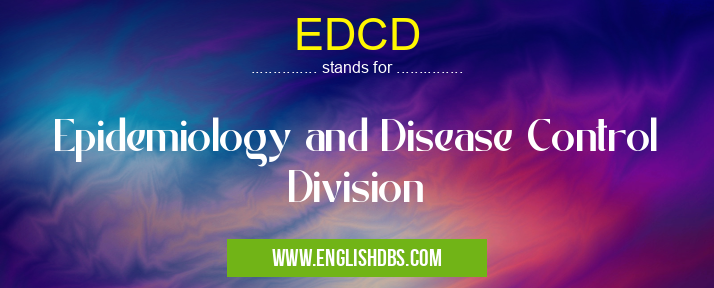What does EDCD mean in DISEASES
Epidemiology and Disease Control Division (EDCD) is a specialized division of health authorities, primarily in the public sector. It focuses on disease surveillance, prevention, and control. This division works to identify patterns of disease outbreaks and develop strategies to prevent them from occurring in the future. The EDCD also provides guidance on surveillance activities, such as setting up systems for collecting patient information, conducting laboratory tests and monitoring vaccine effectiveness. In addition, they focus on public health initiatives including education and promotion of healthy lifestyles for individuals and communities. Finally, EDCD researchers develop interventions for infectious diseases with an aim to reduce transmission rates.

EDCD meaning in Diseases in Medical
EDCD mostly used in an acronym Diseases in Category Medical that means Epidemiology and Disease Control Division
Shorthand: EDCD,
Full Form: Epidemiology and Disease Control Division
For more information of "Epidemiology and Disease Control Division", see the section below.
Definition
The Epidemiology and Disease Control Division (EDCD) is responsible for the application of scientific knowledge to promote good health practices and prevent or reduce disease risk factors through research-based strategies. EDCD is a part of many government agencies that are involved in preventing or controlling communicable diseases or other health risks through data collection, analysis, implementation of control measures, awareness campaigns, monitoring systems and coordination with national and international bodies.
Role of EDCD
The role of EDCD is twofold – firstly it helps investigate the causes behind diseases by carrying out epidemiological studies in order to determine which factors are most likely contributing to an outbreak or its spread. Through this data collection process they can then make informed decisions about how best to target interventions in order to reduce risk or improve outcomes. Secondly, they use their findings from these studies as the basis for developing policies that enable more effective prevention and control efforts at a regional level as well as global level.
Essential Questions and Answers on Epidemiology and Disease Control Division in "MEDICAL»DISEASES"
What are the key activities of the Epidemiology and Disease Control Division?
The Epidemiology and Disease Control Division (EDCD) is responsible for preventing, controlling and managing diseases in the population. It does this by gathering epidemiological data, identifying risk factors, developing health policies and practices, monitoring disease trends, conducting research and surveillance activities, providing technical assistance to other divisions within the Ministry of Health, developing public health education campaigns and programmes, responding to disease outbreaks, and liaising with international agencies.
How often do EDCDs monitor disease trends in populations?
EDCDs are constantly monitoring disease trends in populations using regular epidemiological data collection methods such as surveys or case reports. This allows them to detect new or emerging public health threats early on so that appropriate responses can be created before any significant harm occurs.
What type of research does EPCCD conduct?
The EDCD conducts research into various aspects of public health such as risk factors for certain diseases, prevention strategies, vaccine effectiveness, healthcare access and delivery systems in different parts of the country/world. In addition to this, they also conduct qualitative studies which aim to gain an understanding into social determinants which influence health outcomes.
What is the role of EDCD in a pandemic situation?
During a pandemic crisis like COVID-19, the Epidemiology and Disease Control Division plays a vital role in managing the spread of disease by evaluating available evidence and providing advice on how best to prevent its spread as well as making sure affected individuals receive timely treatment. They also provide support for contact tracing initiatives and recommend quarantine measures when necessary.
How can EDCD help during an outbreak?
During an outbreak such as Ebola or Zika virus infections, EDCD will assist local authorities by providing expertise related to infection control practices amongst other things such as assisting with investigations into possible sources of infection. They also provide guidance on how best to handle potential cases while protecting healthcare workers from any potential risks.
How do EDCDS work with international agencies during pandemics?
While managing a pandemic crisis like COVID-19 internationally, EDCDS works closely with international organisations such as WHO (World Health Organisation), CDC (Centers for Disease Control & Prevention), etc., to ensure harmonised response across countries creating standardised protocols that minimise global disruption caused by varied strategies being used across regions.
What kind of resources is provided by EDCDS during a pandemic situation?
During an ongoing pandemic crisis like COVD-19 epidemic, EPCCD provides essential resources such as lab testing kits both nationally & internationally; emergency funds & grants for hospitals; protective gear & supplies; humanitarian aid for those affected; rapid response teams around the world; communication channels & networks between countries ; and vaccination programmes etc.,to help contain its spread.
Are there specific criteria required before one can join EPCCD?
Yes there are certain criteria required before one can join EPCCD. These include having at least 4 - 5 years experience in public health research/practice or equivalent field; knowledge on topics regarding infectious diseases & epidemics; good communication skills both written & oral ; strong leadership capabilities ; flexibility with remote working environment ; ability to think critically & work under pressure when needed etc.,
Final Words:
The Epidemiology and Disease Control Division (EDCD) plays an important role in keeping populations healthy by understanding the causes behind disease outbreaks and implementing strategies to mitigate their impact on individuals and communities alike. They collect data regarding incidence rates of different diseases over time; conduct epidemiological studies; implement intervention strategies based on the results obtained; collaborate with local governments; keep track of vaccine effectiveness; manage educational programs related to public health initiatives; monitor patients with chronic illnesses; lead research projects related to disease development; coordinate activities between various stakeholders involved in containment efforts; develop effective communication channels with decision makers at all levels etc.
